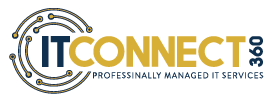
by IT Connect 360 | Jan 31, 2024
Staying ahead of the curve is not just an advantage—it’s a necessity. Professional IT consulting services have emerged as a cornerstone for businesses aiming to navigate the complex digital environment efficiently. Whether you’re a small startup or a large corporation, understanding when to seek professional IT consulting can be the key to unlocking new opportunities, enhancing operational efficiency, and driving your business forward. Let’s explore the critical moments that signal the need for expert IT guidance.
Scaling Your Business
When your business is growing, scaling your IT infrastructure can be a daunting task. Professional IT consultants can provide strategic insights and solutions that align with your business goals, ensuring your technology scales seamlessly with your growth.
Implementing New Technologies
Keeping up with the latest technologies is crucial for staying competitive. If you’re looking to implement new systems, such as cloud computing or cybersecurity solutions, IT consultants can help you navigate the options, ensuring you choose the technologies that best fit your needs.
Enhancing Cybersecurity
As cyber threats become more sophisticated, ensuring your business is protected is non-negotiable. IT consulting firms specialize in comprehensive cybersecurity strategies, safeguarding your data and systems from potential breaches.
Improving IT Efficiency
If your IT operations are not as efficient or effective as they could be, it’s time to consider consulting services. IT consultants can analyze your current operations and implement streamlined solutions to enhance productivity and reduce costs.
Digital transformation is more than just a buzzword; it’s a strategic imperative. If your business is undergoing a digital overhaul, professional consultants can guide your transformation, ensuring it’s smooth, strategic, and successful.
The Benefits of Professional IT Consulting
Expertise and Experience: IT consultants bring a wealth of knowledge and industry experience, offering tailored solutions that address your specific challenges.
Cost Efficiency: By optimizing your IT operations and infrastructure, consultants can help you save on costs in the long run.
Strategic Insight: Consultants provide strategic guidance, helping you make informed decisions that align with your business objectives.
Innovation: Access to cutting-edge solutions and technologies ensures your business stays ahead of technological trends.
Risk Management: Expert consultants can help you identify and mitigate IT risks before they impact your business.
FAQ
Q: How do I choose the right IT consulting firm?
A: Look for a firm with a proven track record, relevant industry experience, and a clear understanding of your business needs. It’s also important to ensure they have a robust portfolio of services and a team of certified professionals.
Q: Can small businesses benefit from IT consulting?
A: Absolutely. IT consulting can be particularly beneficial for small businesses by providing access to expertise and technologies that may not be available in-house, enabling them to compete more effectively in their market.
Professional IT consulting services are invaluable for businesses looking to navigate the complexities of the modern tech landscape. Whether you’re aiming to scale, innovate, or simply optimize your IT operations, knowing when to seek expert advice can make all the difference in achieving your goals. If you find yourself facing any of the scenarios outlined above, it might be time to consider the strategic advantage of partnering with a professional IT consulting firm.

by IT Connect 360 | Jan 30, 2024
Unveiling the Need for Robust Digital Defense
Welcome to our latest blog post where we explore the critical importance of vulnerability assessment in the ever-evolving digital landscape. In an age where cyber threats loom large, understanding and implementing effective vulnerability assessment strategies is crucial for businesses and individuals alike. Join us as we navigate through the reasons that make vulnerability assessment not just a choice, but a necessity.
Understanding Vulnerability Assessment
What is Vulnerability Assessment? Vulnerability assessment is a systematic review of security weaknesses within an information system. It evaluates if the system is susceptible to any known vulnerabilities, assigns severity levels to those vulnerabilities, and recommends remediation or mitigation, if and when necessary.
The Significance of Regular Vulnerability Assessments
Regular vulnerability scans and assessments stand as a cornerstone in maintaining robust cybersecurity defenses. They go beyond mere compliance and data protection, weaving a comprehensive safety net around your digital assets. Let’s explore this in more detail:
1. Proactive Threat Identification
- Staying Ahead of Cyber Threats: Regular vulnerability scans act as an early warning system. They help in identifying and addressing security flaws before they can be exploited by attackers. This proactive approach is crucial in an environment where cyber threats evolve rapidly.
2. Ensuring Compliance and Avoiding Penalties
- Meeting Industry Standards: Many industries are bound by strict regulatory requirements regarding data security. Regular assessments ensure that your systems remain compliant with these standards, thus avoiding hefty fines and legal repercussions that can arise from non-compliance.
3. Protecting Sensitive Data
- Fortress for Customer and Business Information: In an era where data breaches can lead to significant financial and reputational damage, vulnerability assessments are vital. They protect not just your customers’ sensitive information but also your internal data from falling into the wrong hands.
4. Customer Confidence and Trust
- Building a Reputation for Safety: When customers know that a business takes cybersecurity seriously, it enhances their trust. Regular vulnerability scans demonstrate your commitment to safeguarding their data, thereby boosting customer loyalty and trust.
5. Cost-Effective Risk Management
- Minimizing Potential Losses: By identifying vulnerabilities early, businesses can avoid the high costs associated with data breaches, including legal fees, penalties, and loss of business. Regular assessments are a cost-effective strategy in the long-term protection of your digital infrastructure.
6. Continual Improvement of Security Posture
- Evolving with the Threat Landscape: The cyber world is dynamic, with new threats emerging constantly. Regular vulnerability scans enable businesses to adapt their security strategies promptly, ensuring they are always prepared for the latest security challenges.
7. Enhancing Internal Security Awareness
- Fostering a Culture of Cybersecurity: Regular assessments keep security at the forefront of organizational practices. They encourage a culture where every employee is aware of the potential risks and their role in maintaining cybersecurity.
The Role of Vulnerability Assessment in Cybersecurity
Preventing Data Breaches: Vulnerability assessments are vital in preventing data breaches. By identifying and addressing weaknesses before they can be exploited, businesses can significantly reduce the risk of unauthorized access to sensitive data.
Maintaining Compliance: Many industries are governed by regulatory standards that mandate regular security assessments. Vulnerability assessment ensures compliance with these regulations, avoiding potential legal and financial penalties.
Building a Culture of Security: Regular vulnerability scans cultivate a security-focused mindset within organizations. This proactive approach is key to staying ahead of potential cyber threats.
A Real-World Example
Consider a financial institution that handles sensitive customer data daily. By conducting regular vulnerability assessments, it can identify potential security gaps, such as unpatched software or weak encryption standards, and take timely action to fortify its defenses. This not only protects customer data but also enhances the institution’s reputation for reliability and trustworthiness.
Your Questions Answered
Q: How often should a vulnerability assessment be conducted?
A: The frequency of vulnerability assessments can vary depending on the size of the network, the type of data handled, and the ever-changing cyber threat landscape. However, as a general rule, it is advisable to conduct assessments at least quarterly.
Frequently Asked Questions (FAQs)
1. Is vulnerability assessment the same as penetration testing?
- No, they are different. Vulnerability assessment focuses on identifying and quantifying vulnerabilities, while penetration testing (pen-testing) attempts to exploit these vulnerabilities to determine their impact.
2. Can small businesses benefit from vulnerability assessments?
- Absolutely! No matter the size, businesses must protect their data and systems. Vulnerability scans are scalable to fit the needs of any organization.
3. Are automated tools sufficient for vulnerability assessment?
- While automated tools are a significant component, they should be complemented with manual testing and analysis for comprehensive coverage.
The importance of vulnerability scans in today’s digital world cannot be overstated. It is a critical component of any cybersecurity strategy, essential for protecting sensitive data, maintaining compliance, and building customer trust. By regularly conducting vulnerability assessments, businesses can stay a step ahead in safeguarding their digital assets against the ever-present threat of cyberattacks.
Need some help? Reach out to us today here.

by Jason Ruediger | Sep 20, 2023
Elevate Your Business with Comprehensive IT Solutions from IT Connect 360
In San Diego’s dynamic tech landscape, IT Connect 360 stands out as a hallmark of excellence, offering unparalleled IT support and consulting services tailored for diverse business needs.
A Legacy of Excellence in San Diego IT Consulting
At IT Connect 360, we pride ourselves on our rich history of delivering top-tier IT solutions. With over a decade of combined experience, our team has consistently demonstrated a commitment to ensuring that businesses in San Diego thrive in an ever-evolving digital environment.
Holistic IT Solutions for Modern Challenges
1. Proactive IT Monitoring and Maintenance
We understand the importance of uptime in today’s fast-paced business world. Our team offers continuous monitoring of systems and networks, ensuring minimal disruptions and maximum productivity.
2. Expert San Diego IT Consulting
From strategic IT planning to the implementation of cutting-edge technologies, our consultants are equipped to guide your business through every IT challenge, ensuring that technology becomes a catalyst for your growth.
3. Comprehensive Computer Services
Whether it’s addressing booting issues, resolving virus problems, or optimizing startup times, our computer services are designed to ensure that your hardware runs efficiently and reliably.
4. Robust Network Security
In an age of increasing cyber threats, IT Connect 360 is dedicated to safeguarding your business. Our network security solutions are not just about defense but also about empowering businesses to operate with confidence.
Why Choose IT Connect 360?
- Client-Centric Approach: Our clients are at the heart of everything we do. We believe in building lasting relationships based on trust, transparency, and mutual growth.
- Global Expertise, Local Touch: While our experience spans across national projects, our primary focus remains on serving the San Diego community with dedication.
- Customized IT Strategies: We recognize that every business is unique. Our solutions are tailored to align with your specific goals and challenges.
Empowering Businesses, One Solution at a Time
Our mission goes beyond just solving IT problems. We aim to be partners in your success. By leveraging advanced technologies and industry best practices, we provide IT services that not only resolve immediate issues but also position your business for future success.
Testimonials
“Partnering with IT Connect 360 was a game-changer for us. Their expertise in managing our IT infrastructure allowed us to focus on what we do best. Their team is responsive, knowledgeable, and always ready to help.” – Business Owner, San Diego
Join the IT Connect 360 Family
If you’re seeking an IT partner that offers a blend of technical expertise, business acumen, and a genuine commitment to your success, look no further than IT Connect 360. Let’s connect and elevate your business to new heights.
Contact IT Connect 360 Today!
For a consultation or to learn more about our services, reach out to our dedicated team. We’re here to ensure that your IT infrastructure is a pillar of strength in your business journey.

by Jason Ruediger | Jul 16, 2023
In today’s digital era, businesses rely heavily on technological infrastructure to drive growth and maintain competitiveness. As companies strive to enhance their IT capabilities, the demand for effective IT managed services near me has grown exponentially. In this comprehensive guide, we will explore the power of IT managed services and provide you with proven strategies to boost your business’s success. Whether you’re a small startup or an established enterprise, implementing these techniques will position your business for exponential growth and improved customer satisfaction.
1. Understand the Benefits of IT Managed Services Near Me:
– Enhanced operational efficiency: Outsourcing IT services to reliable providers allows businesses to focus on core competencies, optimizing productivity and workflow.
– Access to cutting-edge technology: By collaborating with IT managed services near you, your business can leverage the latest technology solutions without bearing the high costs associated with in-house infrastructure.
– Proactive risk mitigation: Professional IT service providers offer 24/7 monitoring, threat detection, and rapid response to ensure data security, compliance, and protection against cyber threats.
– Scalable solutions: As your business grows, IT managed services can easily adapt to your evolving needs, ensuring scalability and continuity of operations.
2. Assess Your IT Requirements:
Before embarking on your search for IT managed services near you, clearly define your business objectives and IT needs. Are you in need of comprehensive network management, security solutions, or cloud services? Determine your priorities to ensure you find the right IT partner that aligns with your specific requirements.
3. Research Local IT Managed Service Providers:
To truly unlock the power of IT managed services near you, conduct thorough market research to identify reputable service providers with a track record of delivering reliable solutions. Check online reviews, seek recommendations, and evaluate their range of services, certifications, and industry experience. Choose a provider with a solid reputation and expertise in your specific industry.
4. Clarity in Service Level Agreements (SLAs):
During the contract phase, clarity is key. Ensure that your chosen IT managed service provider clearly outlines the terms and conditions in a Service Level Agreement (SLA). The SLA should define the scope of services, response times, escalation procedures, and any other essential details that guarantee service reliability and adherence to performance targets.
5. Proactive Monitoring and Maintenance:
One of the most vital aspects of IT managed services is proactive monitoring and maintenance. Opt for a provider that offers continuous monitoring, real-time threat detection, patch management, and regular system updates to minimize any potential disruptions to your business operations.
6. Disaster Recovery and Business Continuity Planning:
Data loss, natural disasters, or unexpected events can significantly impact business continuity. Ensure your IT managed service provider includes robust disaster recovery and business continuity planning as part of their services. Regular backups, redundant systems, and a comprehensive recovery strategy will safeguard your critical data and minimize downtime.
7. Cybersecurity Best Practices:
Cyber threats are on the rise, and businesses of all sizes are vulnerable. Partner with an IT managed service provider that prioritizes cybersecurity best practices and deploys robust security measures such as firewalls, intrusion detection systems, encryption, and employee awareness training. Regular vulnerability assessments and penetration testing should be conducted to identify and address vulnerabilities proactively.
8. Scalability and Flexibility:
Your business needs may change over time, so it’s essential to select an IT managed service provider capable of scaling their offerings and responding to your evolving requirements. Whether it’s expanding your workforce or incorporating new software, ensure your provider can seamlessly adapt their services to accommodate your growth.
9. Transparent Communication Channels:
Effective communication is the cornerstone of successful IT managed services. Choose a provider that maintains transparent and frequent communication channels, promptly addressing your concerns, providing regular updates, and offering proactive suggestions for improvement.
10. Continuous Improvement and Optimization:
To truly optimize IT managed services near you, focus on continuous improvement and optimization. Collaborate with your provider to assess your IT infrastructure regularly, identify areas of improvement, and develop a roadmap for innovation. A forward-thinking approach will keep your business at the forefront of technological advancements, driving continuous growth and success.
Unlocking the power of IT managed services near you can transform your business and level up your technological capabilities. By embracing the strategies outlined in this comprehensive guide, you will position your business for long-term success, improved efficiency, and enhanced cybersecurity. Remember, the key to finding the perfect IT managed service provider lies in thoroughly assessing your needs, establishing strong partnerships, and embracing continuous improvement. Stay ahead of the competition by leveraging the expertise of local IT managed services near you.
Question: How can implementing IT managed services near me benefit my business?
Answer: Implementing IT managed services near you can benefit your business in several ways:
1. Enhanced operational efficiency.
2. Access to cutting-edge technology.
3. Proactive risk mitigation.
4. Scalable solutions that adapt to your business growth.
by IT Connect 360 | Apr 18, 2022

Seven things that pandemic taught us about data security
As workers fled home to handle everything remotely, organizations had to quickly address new threats and questions that were raised about maintaining the integrity and safety of their data.
From the IT perspective, the pandemic…
- Reinforced the need to follow good password hygiene
- Brought to light the need to engage in data security and access best practices through mechanisms like multi-factor authentication
- Showed us how important staff training is in terms of data security. The ability of employees working remotely in a less secure environment to identify phishing scams or malicious attachments that could compromise the entire business data setup is really critical. Your data security’s first line of defense is your staff. And this is never more true when they are working remotely.
- Proved that smooth, secure and timely access to data is a must-have for business continuity. This means technologies facilitating remote work, such as the cloud, VoIP and other collaboration tools are not a matter of choice anymore. They are a part of the core requirements for the smooth functioning of your business.
- Taught us that agility is everything in today’s world. When the pandemic struck, businesses that did well or even survived were the ones that were quick to make the transition to the remote work environment. Agility requires IT support that can pivot quickly to meet new demands.
- Has given root to the WFH culture, which likely won’t wither away even as the pandemic fades. WFH is here to stay and businesses and customers alike have to adapt to this ‘new normal’.
What role can MSPs play?
Managed service providers can make transitions smoother for businesses from the IT perspective even during unforeseen circumstances such as this pandemic. They can bring to the table the much needed agility factor, which can help the business cope with the demands of the newly created work environment. Even businesses with in-house IT teams can benefit tremendously from the expertise and experience that Managed Service Providers have to offer.

by IT Connect 360 | Apr 11, 2022
Despite annoying challenges presented by the abrupt shift to the WFH model thanks to the pandemic, there were some tech heroes that saved the day. These two made WFH possible.
The cloud
The cloud is that platform whereby you outsource your data storage as well as many of your applications. With the cloud, your data and software applications are no longer physically located in a specific geographic location. Therefore, access is no longer tethered to a user’s physical location. The cloud was the biggest game changer during the pandemic because it allowed businesses to get anytime, anywhere access to their data as well as critical applications. It wouldn’t be wrong to say that if it weren’t for the cloud, a lot of businesses wouldn’t have been able to survive the pandemic at all.
VoIP
Along with the cloud, VOIP proved to be one of the most critical elements when it came to business continuity during this pandemic. It revolutionized business communications. An acronym for Voice over Internet Protocol, VoIP is a technology that allows you to communicate by sending voice as data packets using the internet. VoIP replaced the old PBX (the phone system which physically tied you to the office if you needed telephony services.) Because VoIP is internet based, it’s functions are accessible from anywhere. It also offers a wider range of services. Going beyond being just a telephone or voice system, VoIP offered organizations a single, unified communication solution that fulfilled all their business communication requirements such as voice calling, video and audio conferencing, and other collaboration requirements–a lifesaver for businesses during the COVID-19 pandemic.
Because these two stars are so important to successful WFH, and because they can be difficult to manage with a small IT staff, using an MSP to manage these tools can be an excellent way to support an organization that relies even partly on remote work.







Recent Comments